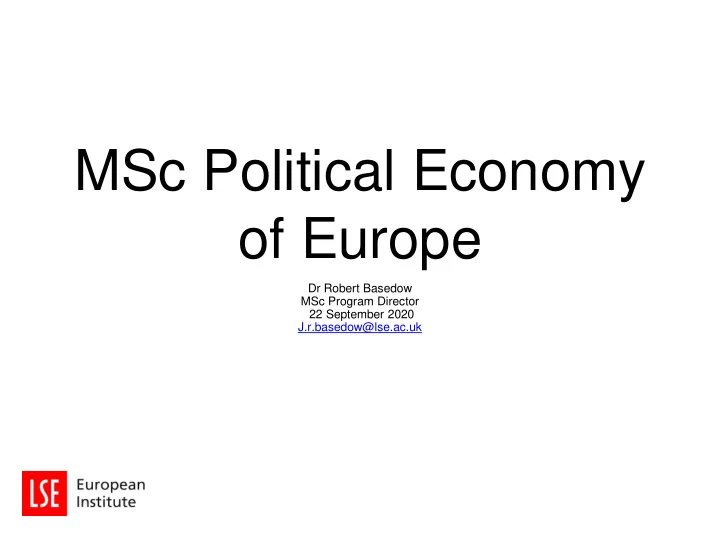

MSc Political Economy of Europe Dr Robert Basedow MSc Program Director 22 September 2020 J.r.basedow@lse.ac.uk
Introduction • Professional staff: Stephen Jenner, Stephanie Finney, Carl-Ludwig Campbell, Adam Judge • Academics: Nick Barr Robert Basedow Iain Begg Valerie Belu Paul De Grauwe (Bob Hancké) Abby Innes Angelo Martelli Fabian Mushövel Bernardo Rangoni Waltraud Schelkle Jimena Valdez
Introduction • Do you have a background in… • Economics, finance, business? • Political science? • Law? • History? • Sociology? • Other?
Introduction • The European Institute is a broad church! • Different approaches: from historical narratives and sociological accounts to formal and econometric modeling • Key question: How do politics and economics interact? • How do politics shape economics? • How do economics influence politics?
Introduction • Broad church means that there are many interpretations and takes on questions ! • We have academic freedom: we can say what we want and think (within reason obviously). • You have the same academic freedom : You will never be in trouble if disagreeing with a lecturer but will be challenged. • Remember: An opinion without a sound logical argument or data is merely a prejudice !
Teaching and Learning Source: Wiki.
Teaching and Learning • We adhere to socratic learning: We give you the ‘tools’ and you make up your mind through a dialogue. • Do not simply repeat what your lecturer says: Try to understand the reasoning and then agree or disagree • We will challenge you: Even if your lecturer agrees with you, you may face a counterargument ! • Do not ever blindly copy what someone else has said! Plagiarism is a very serious offense at LSE!
Teaching and Learning • Building blocks of learning at LSE: • Readings • Discussion and reading groups • Presentations • Essays • Exam preparations • Seminars • Lectures • Office hours
Teaching and Learning • Look around you ! • Your new friends and fellow students will be your best teachers. • Work together: use your different disciplinary and national backgrounds to learn and gain new insights ! • Also bear in mind: No grading on the curve at LSE. You can all get a distinction!
Teaching and Learning • Do not read everything on the reading lists: • Read with a question in mind: Why do you think did we add a piece to the list? • Read to understand: Did you really get the key message? Can you summarize a piece in a couple of sentences? • A rule of thump: In addition to any seminars and lectures, an LSE degree requires approximately 4 hours (+/-) of focused effort ! • Office hours: Do take advantage and come see us to explore new ideas also beyond courses! We want to discuss and get to know you and your ideas!
Programme structure • Basic structure (4 units) • Core courses: choose at least two of three courses from list in course regulations (Paper 1) • Optional courses PoEE: choose two or more optional courses from list in course regulations (Paper 2) • Option courses EI: choose optional courses from course regulations (Paper 3) • MSc Dissertation (Paper 4) • Note: If your course choice is within the regulations, no need to discuss it with me; if a choice is not within the regulation you must talk to 1) course convener, 2) your mentor and then 3) me! • Time line: Opens on Thursday, make first selection for entire year, finalise in week1.
Programme structure • EU410 ‘Research Skills’ • Mandatory • Skills for research and preparation of dissertation • Hints for reading and writing • Weeks MT 1, 2, 4, 8, 10 and LT 1, 2, 4, 8, 10 • Special workshops in reading weeks
Assessment • Formative assessment: It does not count toward your grades. Your chance to test yourself and get feedback ! • Summative assessment: Counts toward your grades! • Essays • Online assessments • You have a right to feedback! Ask for it until you receive it! Without feedback you cannot learn.
Assessment • Deadlines are hard: all students are equal • Penalties for late submission • No excuses (dog ate homework, hard drive blew up…) • Back up your work (DropBox, H:space, USB)! • Extensions of deadlines ONLY under very special circumstances • Special circumstances: Support staff, Programme Director can help
Dissertation • A piece of independent but supervised research work. • 10.000 words • Start thinking about topics now ! • By end of MT (December), polish and try out some ideas and discuss them with mentor and other staff! • From January onwards: a structured process to make you progress on dissertation project !
Housekeeping • Term dates: • Michaelmass term: 28 September - 11 December • Lent term: 18 January – 1 April • Summer term: 4 May - 18 June • Reading weeks: • 2 November - 6 November • 22 February - 26 March • Other dates: • Thursday, 24 September, course choice starts. • This week (mostly Tuesday and Wednesday) meetings with mentors.
Problems • We all sometimes face problem. We can help you! • Mentor • Other academics • Professional staff • Programme director (me) • MSc student adviser (Vassilis Monastiriotis) • Head of Department • Student services • Well-being services
Recommend
More recommend